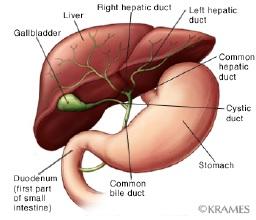Bile Duct Cancer: Frequently Asked Questions
Bile Duct Cancer: Frequently Asked Questions
Here are some answers to frequently asked questions about bile duct cancer.
What is bile duct cancer?
Bile duct cancer is a rare type of cancer that starts in the bile duct. Like most cancers, it is named for the body part in which it began. If cancer cells are found in other parts of the body, the cancer has spread. This is called metastasis.
What are bile ducts?
The bile ducts are thin tubes that extend from the liver to the small intestine. Their purpose is to transport bile. Bile is a fluid made in the liver that breaks down fats during digestion. The liver secretes bile that is then stored by the gallbladder. The liver and gallbladder are connected to each other and to the small intestine. During meals, the gallbladder releases bile through the bile duct system to help with the digestion of food in the intestines. Two areas of the bile duct system are involved in this process:
Intrahepatic bile ducts. These are a network of many small tubes inside the liver that collect bile from liver cells. These join into right and left larger ducts that then exit the liver.
Extrahepatic bile ducts. These are the duct system outside the liver. After exiting the liver, the right and left hepatic ducts join to form the common hepatic duct. The duct draining the gallbladder — called the cystic duct — then merges with the common hepatic duct, which is then called the common bile duct.
What are the risk factors for bile duct cancer?
Healthcare providers are not sure exactly what causes bile duct cancer, but there are some possible risk factors:
Older age
Obesity
An autoimmune disease called primary sclerosing cholangitis
Chronic ulcerative colitis, which is an inflammatory bowel disease
Abnormal bile duct cysts
Stones in the bile duct
Abnormal connection between the common bile duct and the pancreatic duct
Infections from a parasitic worm called a fluke
Cirrhosis of any type
What are the symptoms of bile duct cancer?
People with bile duct cancer may not have any symptoms during early stages when the cancer has not spread. People with this type of cancer may have any or all of these symptoms:
Jaundice, which causes eyes and skin to turn yellow
Pain in the upper right side of the stomach
Itchy skin
Dark brown urine
Fever or chills
Light, clay-colored stool
Bloating, loss of appetite, and weight loss
These symptoms may or may not mean a person has bile duct cancer. A person who is having them should see a healthcare provider right away.
How is bile duct cancer diagnosed?
If a person has symptoms of bile duct cancer, the healthcare provider will do a physical exam, obtain blood tests, and order imaging tests, which let the healthcare provider see inside the body.
Should everyone get a second opinion for a diagnosis of bile duct cancer?
Many people with cancer get a second opinion from other healthcare providers. There are many reasons to get a second opinion. Here are some of those reasons:
Not feeling comfortable with the treatment decision
Being diagnosed with a rare type of cancer
Having several choices for how to treat the cancer
Not being able to see a cancer expert
Requirement of some health insurance companies
Family members or significant others who feel like a second opinion is essential for a sound decision
How can someone get a second opinion?
There are many ways to get a second opinion:
Ask a primary care healthcare provider. He or she may be able to suggest a specialist. This may be a liver MD/hepatologist, surgeon, medical oncologist, or radiation oncologist. Sometimes these healthcare providers work together at cancer centers or hospitals. Never be afraid to ask for a second opinion.
Call the National Cancer Institute's Cancer Information Service. The number is 800-4-CANCER (800-422-6237). They have information about treatment facilities. These include cancer centers and other programs supported by the National Cancer Institute.
Seek other choices. Check with a local medical society, a nearby hospital or medical school, or a support group to get names of healthcare providers who can give you a second opinion. Or ask other people who've had cancer for their recommendations.
How is bile duct cancer treated?
Surgery to remove the tumor is the only way to cure this type of cancer. A cure may be possible if the cancer is found early enough. Radiation may be used before or after surgery. It may be used by itself to ease symptoms if surgery is not possible. Chemotherapy may be used, but has not been shown to be as effective in treating this cancer. It may be given either with radiation or by itself in people with bile duct cancer who are not candidates for surgery. Liver transplant may be a choice for selected patients.
What's new in bile duct cancer research?
Cancer research should give you hope. Healthcare providers and researchers around the world are looking for and studying ways to prevent, detect, and treat this cancer.
Many new drugs are being studied in use with traditional treatments.
Researchers are also studying the use of hyperthermia (heating the body to cause a high fever) in combination with certain chemotherapies to treat inoperable extrahepatic bile duct cancers.
What are clinical trials?
Clinical trials are studies of new kinds of cancer treatments. Healthcare providers use clinical trials to learn how well new treatments work and what their side effects are. Promising treatments are ones that work better or have fewer side effects than the current treatments. People who participate in these studies get to use treatments before the FDA approves them. People who join trials also help researchers learn more about cancer and help future cancer patients.
Updated:
March 21, 2017
Sources:
NCCN Guidelines Version 2.2015 Hepatobiliary Cancers. National Comprehensive Cancer Network
Reviewed By:
Alteri, Rick, MD,Welch, Annette, MNS, OCN
